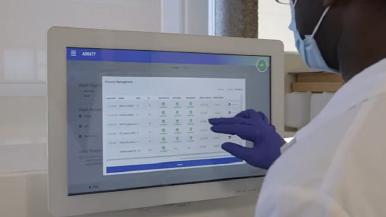The Rush Minority Aging Research Study, the longest-running study of aging in Black men and women, celebrated its 20th anniversary by honoring study participants for devoting their time and efforts in helping advance science.
The Sept. 12 event featured a panel discussion on the impact of MARS in aging research and a ceremony recognizing participants who reached such significant milestones as participating the longest, being the first participant, and having the most home visits for testing.
Funded by the National Institutes of Health, MARS is one of the largest community-based studies in the country aimed at trying to understand and prevent dementia. All participants of MARS are Black men and women, age 65 and older, who haven't been diagnosed with dementia prior to enrollment. As a part of the study, participants undergo annual interviews, cognitive testing, and physical examinations. Participants also have donated their brain to the study, leaving a legacy that marked their contribution to science.
MARS began as a relatively small study in 2004, consisting of about 350 people and has grown to over 850 people enrolled to date, and that number continues to grow. The study has contributed to hundreds of scientific research papers in top medical journals and data presented at research conferences throughout the world.
“We have inspired a new generation of young scientists who want to understand how older African Americans age with grace, and many of them have written research reports using MARS data, helping to launch their careers in science,” said Lisa Barnes, PhD, principal investigator of the Minority Aging Research Study. Barnes is a cognitive neuropsychologist and associate director of the Rush Alzheimer’s Disease Research Center.
MARS is one of three long-term studies on aging that, combined, have enrolled 1,200 Black participants. The others are the African American Clinical Core project, which has continued for 16 years, and the 25-year-old Memory and Aging Project. With these studies, the scientific landscape for aging is rapidly changing and with time will influence policy, shape future research and provide solutions for healthy aging for the generations that follow.
The Rush Alzheimer’s Disease Center is one of 33 Alzheimer’s disease research centers across the country designated and funded by the National Institute on Aging. The Rush center is internationally known as one of the leading Alzheimer’s centers in the country because of its excellence in research and patient care. For more information about Rush Alzheimer’s Disease Center’s ongoing research and community outreach efforts, visit rush.edu/radc.




